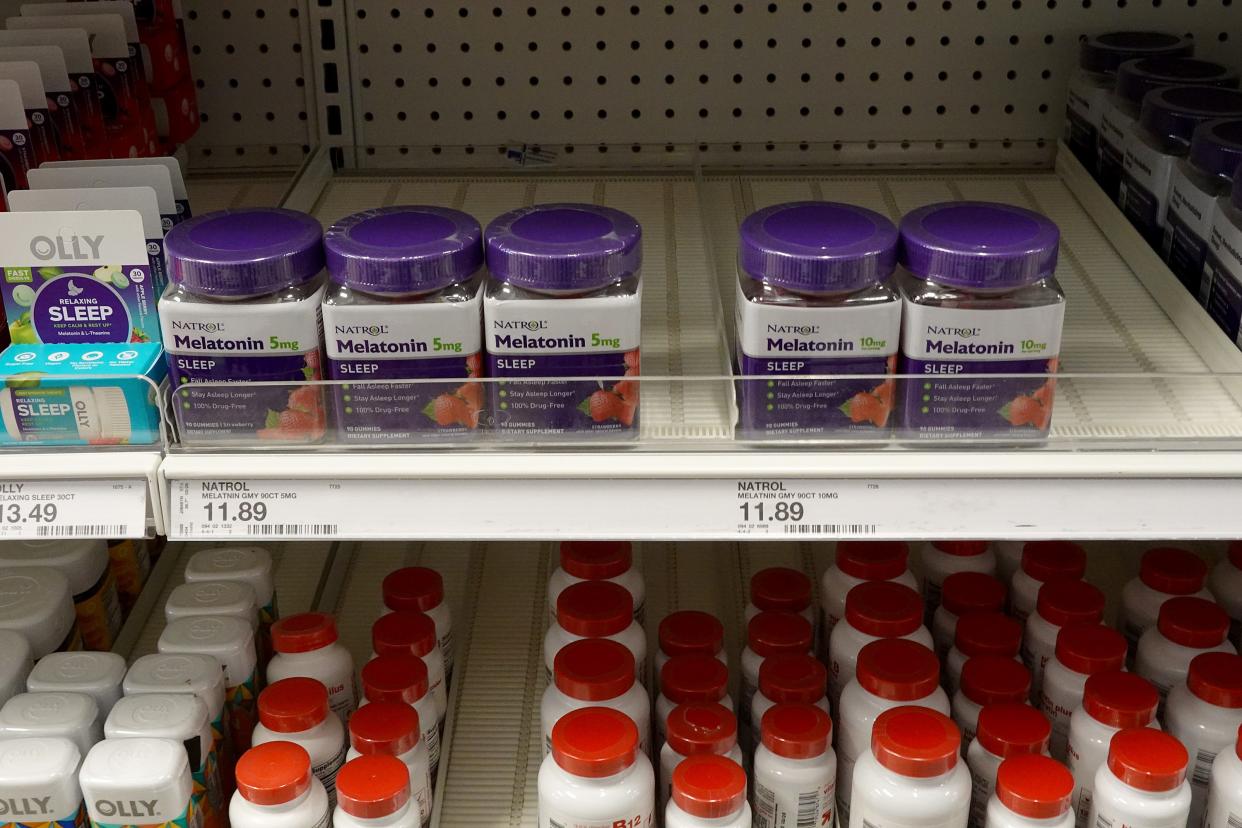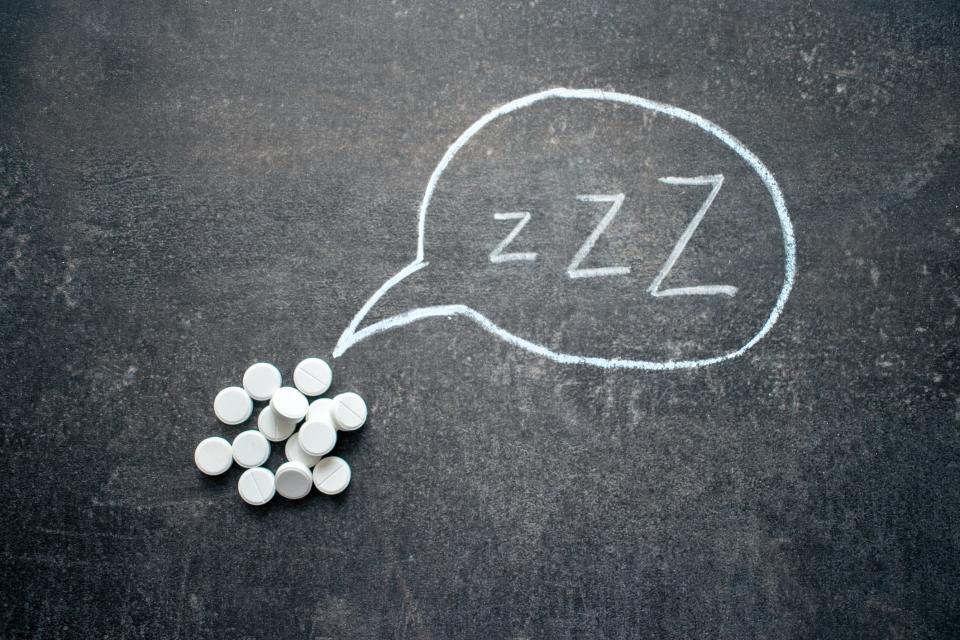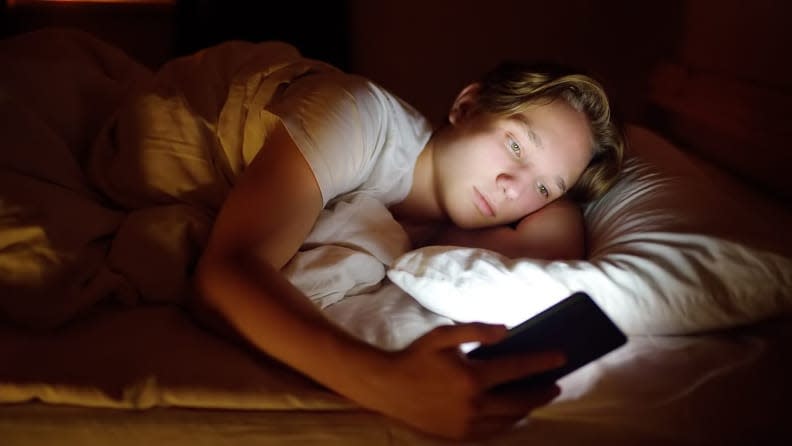With huge spike in melatonin use by children, what parents need to know about kids, sleep

A recent survey by the University of Colorado determined that nearly one in five parents in the United States are giving their elementary- and middle school-aged children melatonin to help them sleep, and many are doing so for extended periods of time.
Among parents of children ages 5-9, 68 of the 368 respondents in an online survey said they had used melatonin supplements in the previous 30 days to help their children sleep. Among parents of 10- to 13-year-olds, 34 of 175 parents reported melatonin use by their children in the previous 30 days, the survey found.
Median use was for 12 months overall, 18 months for children ages 5-9 and 21 months for children ages 10-13. Median dosages ranged from 0.5 milligrams in children ages 1-4 to 2 mg in those ages 10-13 with a high of 10 mg daily.
The survey was conducted from January through April of 2023, researchers wrote in summary published last month in the Journal of American Medicine Pediatrics.
It was prompted, lead researcher Lauren Hartstein said, by what she and others at CU’s Sleep and Development Lab considered “a big uptick in the number of parents who reported that their healthy child, who has no sleep problems, is regularly taking melatonin supplements.”
That uptick, she said, was discovered through routine screening of families interested in participating in various research studies performed by the lab.
More: Does your child's school have lead in its water? Tracking Colorado's testing results
A 2017-18 study of supplement use by U.S. children ages 19 and under found that only 1.3% had used melatonin supplements in the previous 30 days. But that usage has since exploded with a rise in commercial sleep-aids targeted at children in the loosely regulated U.S. supplement market.
Researchers across the nation are working to understand the effects of long-term melatonin usage for children, and a recent study found that advertised dosages in melatonin supplements can vary widely from what's actually in the pills and gummies many American families rely on in search of extra sleep.
So, what is melatonin, and should parents be using it to address sleep issues with their children?
Here’s what we learned, based on conversations with Hartstein, a postdoctoral fellow with a Ph.D. in integrative physiology, and two medical doctors who deal with pediatric sleep issues — Drs. Kirsten Sampera, a pediatrician with the Youth Clinic of Northern Colorado, and Antoinette Burns, a pediatric sleep specialist with Children’s Hospital Colorado and associate professor of clinical practice at the CU School of Medicine:
What is melatonin and where can I get it?

Melatonin is a naturally produced hormone in the body that is synthesized by the pineal gland and released into the bloodstream in an inverse relationship to light exposure, according to the National Institutes of Health. So, more melatonin is released when people are in the dark than when they are in the light. Its effects on the body’s master clock promote sleep at night and wakefulness during the day.
Chemically synthesized and animal-derived melatonin supplements are available over the counter, without a prescription, in the United States in a variety of different forms. In many countries, including the entire European Union, United Kingdom, Australia and Japan, melatonin is classified as a drug and only available by prescription.
Supplements for children come mostly in the form of chewable gummies or tablets in doses 0.25mg to 2.5 mg but also by pill and in liquid form. A separate study published in the Journal of American Medicine in April 2023 and cited by the CU researchers, found that dosage amounts often varied significantly, “from 74% to 347% of the labeled content” and that only three of 25 sampled products were labeled accurately with dosages within 10% of the labeled content.
Sampera and Burns encouraged anyone purchasing melatonin for their children to only purchase products that have been tested independently by United States Pharmacopeia (USP), National Science Foundation (NSF), consumerlab.com or UL Solutions and bearing their respective logos or seals of approval.
Is it dangerous to give my child melatonin?
No, Burns said, provided the child is 2 years of age or older; you stick to low dosages for short time periods and in consultation with a pediatrician or other medical doctor or a nurse practitioner, physician assistant or certified sleep specialist; and that it only be used on a short-term basis.
Studies over the past 40 years have shown melatonin supplements to be relatively safe and an effective part of a treatment plan for sleep disorders in children. Melatonin, she said, can provide needed short-term help while addressing the root cause of sleep problems but should never be the solution or “a standard part of a bedtime routine.”
Sampera expressed concerns about unknown long-term effects of melatonin supplements on children and said she rarely, if ever, recommends its use. She worries about the effect introducing additional levels of one hormone will have on the rest of a child’s hormonal system and their overall growth and development.
If a patient comes to her who is already taking melatonin, “then I discuss how to get off of melatonin,” she said.
Don’t all children have some trouble sleeping at night?
Not necessarily, the doctors said.
“Normal sleep is actually normal, and the fact that we have so many kids with abnormal sleep, I think, speaks to other things going on,” Sampera said. “There are actually children who are good sleepers from early on, and they are good sleepers throughout their years. So, this idea we have that somehow disrupted sleep is a natural part of development is really incorrect, I believe.”
More: Small enrollment, big impact: PSD mountain schools are hubs of three communities
Children don’t begin to produce melatonin until after they’re 3-4 months old, and children younger than that typically cannot sleep for more than 3-4 hours at a time, Burns said. By the time they reach 6 months of age, a typical child might sleep for up to 5 1/2 hours at a time.
Children older than 6 months of age need to learn to self-soothe, she said, meaning they need to learn how to fall back asleep on their own after waking to extend overall sleep time.
“Children have shorter sleep cycles than adults, meaning that they come to a wakeful period more frequently throughout the night than we do,” Burns said. “We all wake up during the night, all of us do. Our brain comes to an awake state, but we fall back asleep easily and don’t remember those episodes.
“That same thing happens in kids, but they can happen more frequently. … Some of that is developmentally normal. It’s that ability to return to sleep that’s important.”
Are there appropriate reasons to give children melatonin supplements?
Yes, Burns said, provided it is part of a treatment plan recommended by a medical professional.
Melatonin, she said, is very effective in shifting someone’s circadian pattern “so that it aligns more with a socially acceptable sleep-wake pattern.” For many people, staying up until 5 or 6 a.m. and sleeping until 1 or 2 p.m., prevents them from leading a productive life. So, shifting their sleep-wake patterns to better match those of their families, friends and others, is beneficial.
Multiple studies, she said, have also found melatonin to be an effective treatment for sleep disorders in people with cerebral palsy, certain forms of autism and other neuro-developmental disorders.
She sees a lot of patients in in her clinic, she said, “where their brains just aren’t functioning in the same way. We have a very high suspicion that that’s due to a melatonin dysfunction — whether they’re not producing enough, not responding to what they produce, maybe not having a normal shift in those levels because the levels have to be high to sleep and low to be awake. So, if they’re not shifting, then they’re going to have a very abnormal sleep cycle.”
Melatonin supplements are also an appropriate form of treatment, she said, for people with Smith-Magenis, a disorder in natural melatonin production, and in children with chronic insomnia.
What are the alternatives?
Sleep is an extremely important issue with children, adolescents and their parents, Sampera said.
“It affects our immune system, it affects our cognition, it affects how we function during our day,” she said. “Are we ever at our best after a crummy night of sleep? No. Kids are the same.”
So, it’s important to correct sleep disorders in children right away, she said.
The use of melatonin, both Sampera and Burns said, can mask behavioral sleep problems that are best treated without the use of drugs or supplements. They work with families to address the root cause of sleep disorders rather than temporary workarounds.
Blue light given off by smartphone, tablet, television and computer screens is known to reduce melatonin production and release at night, Sampera said, and melatonin supplements should not be used simply to correct that. The screen-time on those devices leading to that reduction in melatonin production and release should instead be reduced or eliminated, she said.

Nutrition and physical activity also play important roles in healthy sleep, she said.
And no different than adults, children can’t go, go, go all day long at a high level of mental and physical activity and suddenly shut down at night and go right to sleep.
“You have to transition, and with children especially, transitions are hugely important,” she said.
She works with patients on their “sleep hygiene,” she said. Creating a bedtime routine that helps settle children down both physically and mentally for a good night’s sleep.
Burns also works through the cognitive behaviors first.
What if other approaches to sleep problems don’t work?
As much as she would prefer to find and fix the root of a child’s sleep issue without using melatonin, Burns said she’d rather have her patients use small doses of it — usually 1 mg per day or less given 30 minutes to an hour before bedtime — on a short-term basis than resort to prescription drugs with known risks of side effects.
“With all the studies that have been done so far, none of them have found any serious safety concerns with melatonin,” Burns said. “There are no significant concerns that have been identified. However, we don’t have decades of data, so theoretically, could there be an impact on something else? Absolutely. But we don’t have it at this point.”
Her hope is that parents consult with medical professionals like herself, who are board-certified in sleep medicine and not just calling themselves sleep experts. And that those who then choose to use melatonin supplements to treat sleep concerns with their children understand there might be risks not yet known that will be found through additional research and studies.
“I really want to make sure families are informed and that they’re getting their information from somebody who has studied this and has experience with it,” she said. “It’s a family choice. It’s over the counter. I can discourage it, but it’s more important to me that if they are choosing it, that they are informed consumers, so that they understand the risks of what they are providing to their child and ways that they could potentially make a safer choice.”
Reporter Kelly Lyell covers education, breaking news, some sports and other topics of interest for the Coloradoan. Contact him at kellylyell@coloradoan.com, twitter.com/KellyLyell or facebook.com/KellyLyell.news.
This article originally appeared on Fort Collins Coloradoan: With huge spike in melatonin use by children, what parents should know

